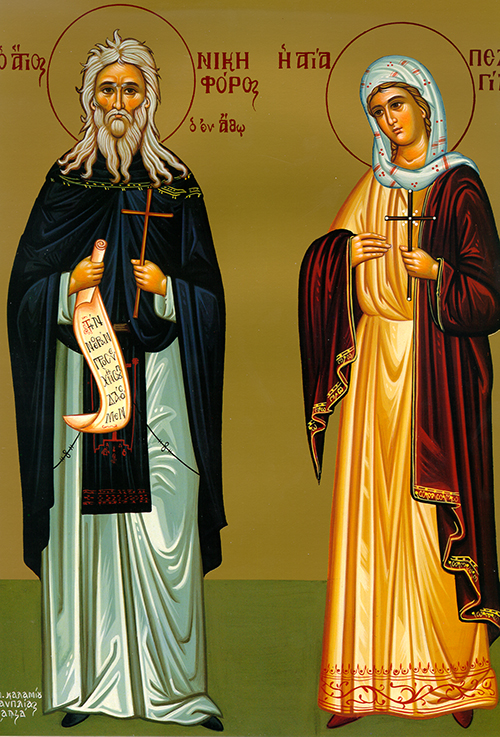

The holy martyr Pelagia of Tarsus in Cilicia (southeastern Asia Minor) lived in the third century during the reign of Diocletian (284-305), and was the daughter of illustrious pagans. When she heard about Jesus Christ from her Christian friends, she believed in Him and desired to preserve her virginity, dedicating her whole life to the Lord. Diocletian sentenced Pelagia to be burned in a red-hot bronze bull. Not permitting the executioners to touch her body, the holy martyr signed herself with the Sign of the Cross, and went into the bronze bull and her flesh melted like myrrh, filling the whole city with fragrance. St. Pelagia’s bones remained unharmed and were removed by the pagans to a place outside the city. Four lions came out of the wilderness and sat around the bones letting neither bird nor wild beast get at them. The lions protected the relics of the saint until Bishop Linus came to that place and gathered them all up and buried the relics with honor. Later, a church was built over her holy relics.
Troparion
O Jesus, your lamb Pelagia cries out to You with great love: O my Bridegroom, I long for You in great pain. I am crucified with You, and in baptism I am buried with You. I suffer for your sake in order to reign with You. I die for You in order to live in You. Accept me as an immaculate victim since I am immolated for your love. Through her intercession, O merciful One, save our souls.
Kontakion
Having inflamed your soul with love of Christ, you entered the boiling pot with courage. You became a sacrifice of pleasing aroma to the Lord. Today we remember you, O wise Pelagia, and we sing to you.
Epistle
Acts 15: 35-41
In those days, Paul and Barnabas continued in Antioch, along with many others, teaching and preaching the word of the Lord. After a certain time Paul said to Barnabas, “Let us go back now and see how the brothers are getting on in each of their towns where we proclaimed the word of the Lord.” Barnabas wanted to take along John, called Mark. But Paul insisted that, as Mark had deserted them at Pamphylia, refusing to join them on that mission, he was not fit to be taken along now. The disagreement which ensued was so sharp that the two separated. Barnabas took Mark along with him and sailed for Cyprus.
Paul, for his part, chose Silas to accompany him on his journey, and in this he was commended by the brothers to the favor of the Lord. He traveled throughout Syria and Cilicia, giving the churches there renewed assurance.
Gospel
John 10: 27-38
The Lord said to the people coming to him: “My sheep hear my voice. I know them, and they follow me. I give them eternal life, and they shall never perish. No one shall snatch them out of my hand. My Father is greater than all, in what he has given me, and there is no snatching out of his hand. The Father and I are one.”
When some of the Jews again reached for rocks to stone him, Jesus protested to them, “Many good deeds have I shown you from the Father. For which of these do you stone me?” The Jews retorted, “It is not for any ‘good deed’ that we are stoning you, but for the blaspheming. You who are only a man are making yourself God.”
Jesus answered: “Is it not written in your law, ‘I have said, You are gods?’ If it calls those men gods to whom God’s word was addressed –and Scripture cannot lose its force– do you claim that I blasphemed when, as he whom the Father consecrated and sent into the world, I said, ‘I am God’s Son?’ If I do not perform my Father’s works, put no faith in me. But if I do perform them, even though you put no faith in me, put faith in these works, so as to realize what it means that the Father is in me and I in him.”
Icon courtesy of Jack Figel, Eastern Christian Publications – ecpubs.com
Friday, May 3 –